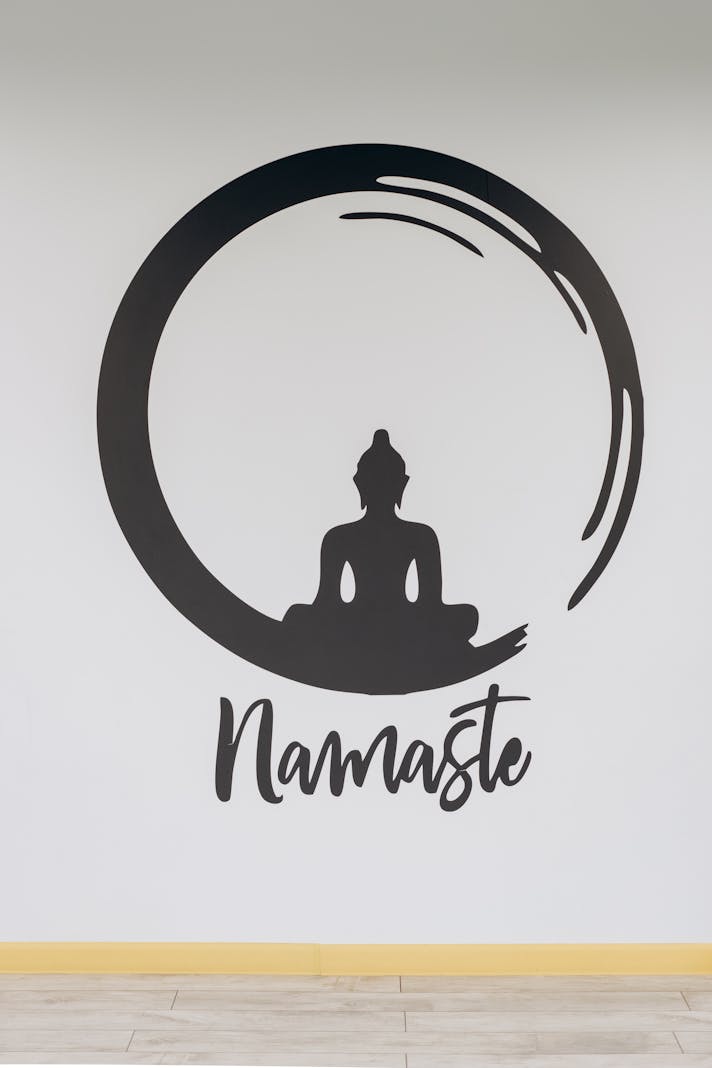Ishvara Pranidhana

We no longer live in an openly religious society. Although many people have personal beliefs, the United States has enshrined the ideal of separating church and state. While this is overall a very good idea, one that allows for freedom of religion, this separation means that we often struggle to find a personal creed that helps us through the difficulties of our lives. Enter yoga, the practice that many of us have come to depend upon. And enter the final niyama, or internal practice suggested by Patanjali as a way to organize our lives. Ishvara Pranidhana, a phrase which means “devotion to the Divine”, encourages us to connect with the holy on a daily basis, and to understand our place in the universe.
An ancient Hindu text, the Bhagavad-Gita, tells the story of Arjuna, a warrior who becomes paralyzed with indecision on the battlefield. He discusses his anxieties with his charioteer, who turns out to actually be the Lord Krishna Himself. Krishna tells Arjuna to offer his activities to the world and to God, and to separate the daily actions from the final result. This is the essence of Ishvara Pranidhana. To use an oft-quoted aphorism, we seek to be the change we desire.
Do you believe that your presence on this earth matters? Ask the people around you, the ones who love you and the ones who simply appreciate your presence. Our actions make a difference, and the sooner that we accept this truth, the sooner we align ourselves with that which we hold important. If we seek a connection with our Higher Power, than we will find It in the world around us. If we then believe that the world is holy, than we will treat it differently – and we will find our actions influencing those of the people around us.
The opposite of Ishvara Pranidhana is egocentricity, or the belief that we are the center of our universe. During the Great Depression of the 1930’s, a man by the name of Bill W came to terms with wreckage of his life by accepting one simple fact: there is a power greater than ourselves. In doing so, he came up with a way of life that proved an alternative to alcoholism, and the fellowship of Alcoholics Anonymous was born. A few decades later, Ernest Kurtz wrote a history of the program, entitling it simply Not God.
Whether we follow a program related to AA, or whether we simply live our lives in service to the ideals of yoga, we are in essence following that one simple idea. We are not the center of our lives, but rather a part of a larger whole. Devoting ourselves to a higher power means that we take the time to acknowledge the miracles in our lives and our concurrent responsibility to provide a means to those miracles for those around us. By acknowledging that we are not God, we become able to see the entire web of life a bit more clearly.
The first nine yamas and niyamas give us precepts for living day-to-day:
ahimsa, or nonharming,
satya, or non-lying,
asteya, or non-stealing,
aparigraha, or non-coveting,
bramacharya, or purity,
tapas, or effort,
saucha, or cleanliness,
santosha, or contentment,
and svadyaya., or self study.
In contrast, Ishvara Pranidhana constitutes both an action and a reason for that action. Surrender is an action that isn’t accomplished immediately, or at a single stroke; rather, it is a way of living that we choose on a daily basis. We take this action because we acknowledge our inter-connectedness and our need for the rest of the universe. When we do so, we glimpse a bit of the spirit of Yoga, a word which itself means “union.” Days go by, and perhaps we forget, but we have our practice to remind us. Whether on the mat, or out in the world, Ishvara Pranidhana keeps us right-sized and thus able to dance with the rest of the world.
An ancient Hindu text, the Bhagavad-Gita, tells the story of Arjuna, a warrior who becomes paralyzed with indecision on the battlefield. He discusses his anxieties with his charioteer, who turns out to actually be the Lord Krishna Himself. Krishna tells Arjuna to offer his activities to the world and to God, and to separate the daily actions from the final result. This is the essence of Ishvara Pranidhana. To use an oft-quoted aphorism, we seek to be the change we desire.
Do you believe that your presence on this earth matters? Ask the people around you, the ones who love you and the ones who simply appreciate your presence. Our actions make a difference, and the sooner that we accept this truth, the sooner we align ourselves with that which we hold important. If we seek a connection with our Higher Power, than we will find It in the world around us. If we then believe that the world is holy, than we will treat it differently – and we will find our actions influencing those of the people around us.
The opposite of Ishvara Pranidhana is egocentricity, or the belief that we are the center of our universe. During the Great Depression of the 1930’s, a man by the name of Bill W came to terms with wreckage of his life by accepting one simple fact: there is a power greater than ourselves. In doing so, he came up with a way of life that proved an alternative to alcoholism, and the fellowship of Alcoholics Anonymous was born. A few decades later, Ernest Kurtz wrote a history of the program, entitling it simply Not God.
Whether we follow a program related to AA, or whether we simply live our lives in service to the ideals of yoga, we are in essence following that one simple idea. We are not the center of our lives, but rather a part of a larger whole. Devoting ourselves to a higher power means that we take the time to acknowledge the miracles in our lives and our concurrent responsibility to provide a means to those miracles for those around us. By acknowledging that we are not God, we become able to see the entire web of life a bit more clearly.
The first nine yamas and niyamas give us precepts for living day-to-day:
ahimsa, or nonharming,
satya, or non-lying,
asteya, or non-stealing,
aparigraha, or non-coveting,
bramacharya, or purity,
tapas, or effort,
saucha, or cleanliness,
santosha, or contentment,
and svadyaya., or self study.
In contrast, Ishvara Pranidhana constitutes both an action and a reason for that action. Surrender is an action that isn’t accomplished immediately, or at a single stroke; rather, it is a way of living that we choose on a daily basis. We take this action because we acknowledge our inter-connectedness and our need for the rest of the universe. When we do so, we glimpse a bit of the spirit of Yoga, a word which itself means “union.” Days go by, and perhaps we forget, but we have our practice to remind us. Whether on the mat, or out in the world, Ishvara Pranidhana keeps us right-sized and thus able to dance with the rest of the world.
You Should Also Read:
Yoga and Truthfulness
The Bhagavad GIta
Saucha

Related Articles
Editor's Picks Articles
Top Ten Articles
Previous Features
Site Map
Content copyright © 2023 by Korie Beth Brown. All rights reserved.
This content was written by Korie Beth Brown. If you wish to use this content in any manner, you need written permission. Contact Korie Beth Brown for details.







